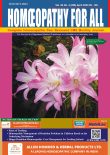Understanding the Divergence: Allopathy vs Homeopathy
Keywords:
Allopathy, Homeopathy, Evidence-based, HolisticAbstract
The ongoing debate between allopathy (conventional medicine) and homeopathy has intrigued both the medical community and patients for centuries. Although both aim to promote healing and alleviate suffering, they operate on fundamentally different principles. Allopathy focuses on evidence based, disease-centred approaches, utilizing pharmaceuticals and surgery to manage symptoms and eradicate diseases. In contrast, homeopathy takes a holistic, individualized approach, treating the person as a whole and stimulating the body's self-healing mechanisms through highly diluted remedies based on the principle of "like cures like." This article explores the core differences between allopathy and homeopathy, discussing their respective strengths, weaknesses, and ideal applications. It also highlights a clinical case study in which homeopathy provided significant relief in a chronic condition that had failed to respond to conventional treatments. The article further examines the potential benefits and challenges of integrating both systems, advocating for a more personalized and holistic approach to patient care.Downloads
References
1. Vithoulkas, G. (2009). "The Science of Homeopathy". New York: International Academy of Classical Homeopathy.
2. Hahnemann, S. (2002). "Organon of the Medical Art" (6th Ed.). Translated by Wenda Brewster O'Reilly. Birdcage Press.
3. Bell, I. R., Koithan, M., & Brooks, A. J. (2013). "Evaluation of Homeopathic Treatment: Evidence, Challenges, and Future Directions". Homeopathy, 102(1), 1-5.
4. Ernst, E. (2002). "A Systematic Review of Systematic Reviews of Homeopathy". British Journal of Clinical Pharmacology, 54(6), 577-582.
5. Mathie, R. T., Lloyd, S. M., Legg, L. A., Clausen, J., Moss, S., Davidson, J. R. T., & Ford, I. (2014). "Randomised Placebo-Controlled Trials of Individualised Homeopathic Treatment: Systematic Review and Meta-Analysis". Systematic Reviews, 3, 142.
6. Ventegodt, S., Morad, M., &
Patient-Centered Approach to Treatment and Care". TheScientificWorldJournal, 4, 273-285.
7. Sackett, D. L., Rosenberg, W. M. C., Gray, J. A. M., Haynes, R. B., & Richardson, W. S. (1996). "Evidence-Based Medicine: What It Is and What It Isn’t". BMJ, 312(7023), 71-72.
8. WHO (World Health Organization). (2019). "WHO Global Report on Traditional and Complementary Medicine". Retrieved from: https://www.who.
int/traditional-complementary integrative-medicine
9. Gopal, R., & Rajalakshmi, G. (2020). "Homeopathy: A Complementary Approach in Healthcare". Indian Journal of Research in Homeopathy, 14(3), 150-158.
10. Sharma, H., & Clark, C. (1998). "Contemporary Ayurveda: Medicine and Research in Maharishi Ayurveda". Churchill Livingstone




